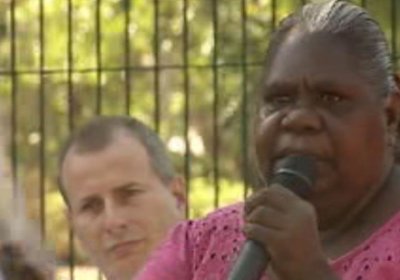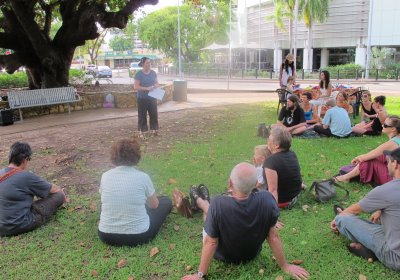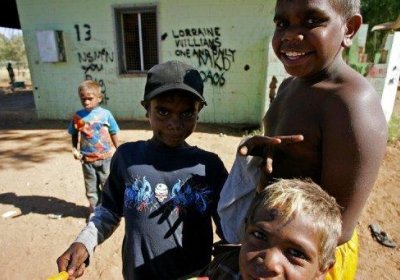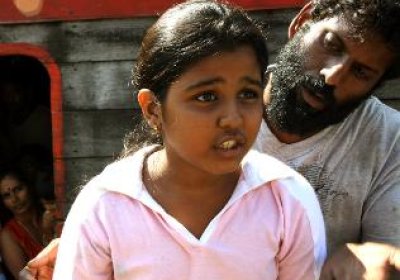A dozen protesters gathered outside the April 13 annual general meeting of Energy Resources of Australia (ERA) to call for the Ranger uranium mine to be closed because a dam containing radioactive mine tailings is close to overflowing.
Protesters dressed as clowns and set up a wading pool full of “nuclear waste” to highlight the risks of radioactive contamination that the “clowns” at ERA are ignoring.
They said it was apt that the meeting was held at Darwin’s Sky City Casino because ERA was gambling with nuclear safety.
Gulumerrdgen/Darwin
One hundred and thirty people packed out a room in the Crowne Plaza hotel to hear traditional owners and nuclear experts call for the closure of the Ranger uranium mine in the world heritage-listed Kakadu national park.
Yvonne Margarula condemned the mine for its presence on land that is sacred to her people — the Mirrar people. “The promises never last,” she said. “But the problems always do.”
Despite crisis levels of overcrowding, many urban Aboriginal communities have been denied federal funding for new housing. On March 18, ABC online said town camps around Darwin were not allocated any of the $1.5 billion in upgrades planned for Aboriginal communities.
ITEC Employment and its related entity Community Enterprises Australia (CEA) are preparing a submission to the federal government that will argue “the pendulum has swung too far in favour of the jobseeker”, in relation to changes to the Community Development Employment Projects (CDEP) on Aboriginal communities, The Australian said on April 2.
CEA is the largest CDEP provider in Australia.
You could be forgiven for thinking that the pendulum swinging “too far in favour of the jobseeker” meant, perhaps, that people were finding work.
Two days after staging a rooftop protest, Burmese Rohingyan refugees inside the Northern Immigration Detention Centre (NIDC), received a notice on March 17 from the immigration department.
“Your concerns about the delays in finalising cases are understandable,” it said.
Twenty people gathered on March 21 in Mitchell Park to commemorate the victims of the March 11 tsunami in Japan. The gathering made paper cranes and heard from Sachi Hirayama from Darwin Youth for the Japanese Disaster who promoted charity events for the cause.
Cat Beaton read a statement from Environment Centre Northern Territory saying that people’s thoughts were with those who lost loved ones as a result of the natural disaster but also with the workers struggling to rebuild after the devastation.
A dozen protesters gathered outside Darwin Magistrates Court on March 8 to call for an end to the detention of asylum seeker children.
The protest was held outside the trial of six teenage asylum seekers, who faced charges with various offences resulting from a scuffle in Darwin immigration detention centre in February.
Richard Davis from the Darwin Asylum Seeker Support and Advocacy Network told ABC Darwin that the youths should not have been charged.
Federal immigration minister Chris Bowen announced plans for a new 1500-bed detention facility on March 3. It is to be located at Wickham Point, an industrial area 35 kilometres south-east of Darwin.
The March 4 NT News said the Darwin Airport Lodge, which currently houses refugees, would also be expanded by 400 beds.
This would bring Darwin’s total detention capacity to 2900, making the city the largest detention location on the mainland — larger even than the notoriously overcrowded Christmas Island facility.
The NT government has failed to change its policy of "First Four Hours" of English in remote Aboriginal schools, despite the trial period expiring in January.
The policy was introduced in January 2009, supposedly as a way to improve English literacy for Aboriginal students. The policy mandated that schools teach only in English for the first four hours — the most productive hours — of school, leaving teaching in local language to the last two, least productive, hours of the day.
It effectively banned Aboriginal language in the classroom.
Ten-year-old Tamil refugee Brindha faces deportation to Sri Lanka after being rejected by the immigration department, the January 3 Australian said.
In March 2010, she told Green Left Weekly the International Organisation for Migration was treating refugees “like animals”.
At the time, she was onboard the Jaya Lestari, a boat packed with 254 Tamil asylum seekers who had tried to reach Australia for protection from persecution.
On August 16, Darwin was the venue for a screening of Our Generation, a landmark new documentary about the plight of Aboriginal people in the Northern Territory living under the repressive NT intervention.
The film focuses on the effects of the intervention on the Yolngu people of East Arnhem Land, which coincided with a move by the NT Labor government to move people off traditional homelands and into larger towns (the “hub town” policy).
- Previous page
- Page 10









